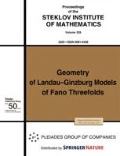Abstract
In 2013, S. Aseev, K. Besov, and S. Kaniovski (“The problem of optimal endogenous growth with exhaustible resources revisited,” Dyn. Model. Econometr. Econ. Finance 14, 3–30) considered the problem of optimal dynamic allocation of economic resources in an endogenous growth model in which both production and research sectors require an exhaustible resource as an input. The problem is formulated as an infinite-horizon optimal control problem with an integral constraint imposed on the control. A full mathematical study of the problem was carried out, and it was shown that the optimal growth is not sustainable under the most natural assumptions about the parameters of the model. In the present paper we extend the model by introducing an additional possibility of “random” transition (jump) to a qualitatively new technological trajectory (to an essentially unlimited backstop resource). As an objective functional to be maximized, we consider the expected value of the sum of the objective functional in the original problem on the time interval before the jump and an evaluation of the state of the model at the moment of the jump. The resulting problem also reduces to an infinite-horizon optimal control problem, and we prove an existence theorem for it and write down an appropriate version of the Pontryagin maximum principle. Then we characterize the optimal transitional dynamics and compare the results with those for the original problem (without a jump).
Similar content being viewed by others
References
D. Acemoglu, Introduction to Modern Economic Growth (Princeton Univ. Press, Princeton, NJ, 2008).
P. Aghion and P. Howitt, Endogenous Growth Theory (MIT Press, Cambridge, MA, 1998).
S. Aseev, K. Besov, and S. Kaniovski, “The problem of optimal endogenous growth with exhaustible resources revisited,” in Green Growth and Sustainable Development (Springer, Berlin, 2013), Dyn. Model. Econometr. Econ. Finance 14, pp. 3–30.
S. M. Aseev, K. O. Besov, and A. V. Kryazhimskiy, “Infinite-horizon optimal control problems in economics,” Usp. Mat. Nauk 67 (2), 3–64 (2012) [Russ. Math. Surv. 67, 195–253 (2012)].
S. M. Aseev and A. V. Kryazhimskii, The Pontryagin Maximum Principle and Optimal Economic Growth Problems (Nauka, Moscow, 2007), Tr. Mat. Inst. im. V.A. Steklova, Ross. Akad. Nauk 257 [Proc. Steklov Inst. Math. 257 (2007)].
E. J. Balder, “An existence result for optimal economic growth problems,” J. Math. Anal. Appl. 95, 195–213 (1983).
R. J. Barro and X. Sala-i-Martin, Economic Growth (McGraw Hill, New York, 1995).
K. O. Besov, “On necessary optimality conditions for infinite-horizon economic growth problems with locally unbounded instantaneous utility function,” Tr. Mat. Inst. im. V.A. Steklova, Ross. Akad. Nauk 284, 56–88 (2014) [Proc. Steklov Inst. Math. 284, 50–80 (2014)].
G. M. Grossman and E. Helpman, Innovation and Growth in the Global Economy (MIT Press, Cambridge, MA, 1991).
C. I. Jones, “Growth and ideas,” in Handbook of Economic Growth, Ed. by P. Aghion and S. N. Durlauf (North-Holland, Amsterdam, 2005), Vol. 1B, pp. 1063–1111.
R. M. Solow, Growth Theory: An Exposition (Oxford Univ. Press, New York, 1970).
M. L. Weitzman, Income, Wealth, and the Maximum Principle (Harvard Univ. Press, Cambridge, MA, 2003).
Author information
Authors and Affiliations
Corresponding author
Additional information
Published in Russian in Trudy Matematicheskogo Instituta imeni V.A. Steklova, 2015, Vol. 291, pp. 56–68.
Rights and permissions
About this article
Cite this article
Besov, K.O. Problem of optimal endogenous growth with exhaustible resources and possibility of a technological jump. Proc. Steklov Inst. Math. 291, 49–60 (2015). https://doi.org/10.1134/S0081543815080052
Received:
Published:
Issue Date:
DOI: https://doi.org/10.1134/S0081543815080052




